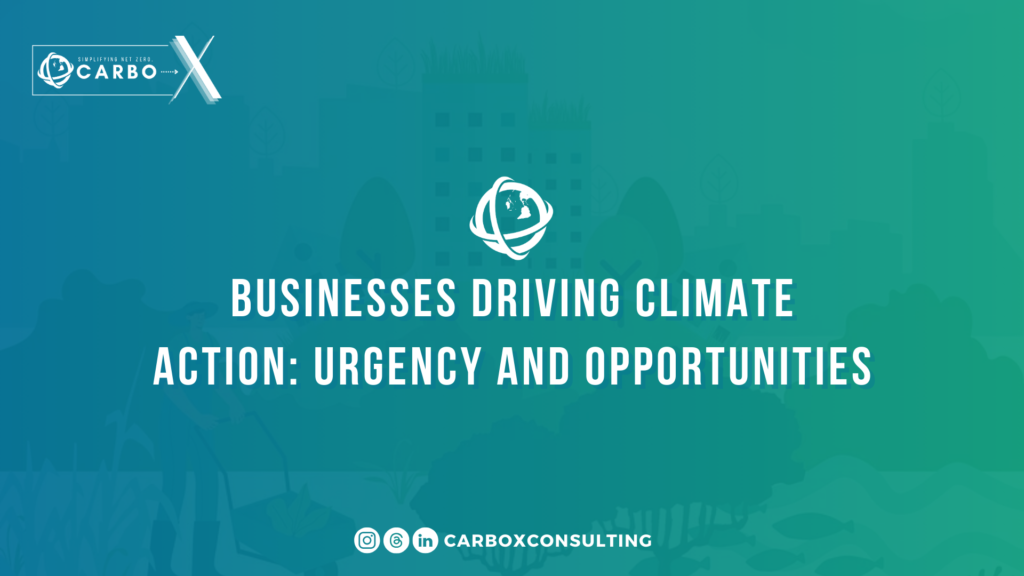In the contemporary landscape, the imperative for decisive action on climate change has become increasingly conspicuous. Climate change is no longer a remote concern but a pressing reality necessitating immediate attention. For businesses, grappling with and mitigating the challenges presented by climate change is not only a moral obligation but also a strategic imperative. This article delves into the scientific underpinnings of climate change, its ramifications for businesses, and the globally pertinent policies and mechanisms shaping the sphere of climate action.
The Scientific Underpinnings of Climate Change
The evidence unequivocally underscores the rapidity of climate change. From escalating global temperatures to the proliferation of more frequent and intense weather anomalies, the manifestations of climate change are unequivocal. Whereas preceding generations may have witnessed a gradual evolution, successive cohorts inherit a world where the impacts of climate change are accelerating. The chief catalyst behind this transformation remains the emission of greenhouse gases (GHGs), predominantly stemming from human activities such as fossil fuel combustion and deforestation.
According to the Intergovernmental Panel on Climate Change (IPCC), curtailing global warming to 1.5°C necessitates a substantial reduction in GHG emissions. The temporal window for action is rapidly narrowing, with critical benchmarks set for 2030 and 2050. Procrastination in addressing these imperatives will only exacerbate the challenges at hand, constraining prospects for future generations. The imperative for action is urgent and immediate.
While people in their 50s to 70s today have mostly experienced the effects of a slow but steady rise in global temperatures, their children and grandchildren are born into a world of rapidly rising temperatures. A warmer world caused by the release of greenhouse gas (GHG) emissions mean more extreme weather events and potentially devastating impacts and risks.
Climate change reverberates across all sectors of business, engendering amplified energy expenditures, disruptions in supply chains, and shifts in consumer preferences. The risks are palpable, yet concurrently, avenues for innovation and leadership emerge for those willing to embrace the imperatives of climate action. By proactively adopting measures to mitigate and adapt to climate change, businesses can safeguard their economic viability while bolstering their standing and competitive edge in an increasingly sustainability-oriented marketplace.
Navigating the trajectory towards climate leadership necessitates a dual-pronged approach encompassing both mitigation and adaptation strategies. Mitigation endeavors pivot on curtailing GHG emissions through initiatives like transitioning to renewable energy sources and espousing sustainable practices. Conversely, adaptation entails fortifying resilience against the impacts of climate change, including infrastructure reinforcement and the establishment of early warning systems. By investing in these stratagems, businesses can fortify themselves against the exigencies of climate change while contributing substantively to global emissions reduction endeavors.

Global Policies and Mechanisms
International collaboration constitutes a linchpin in addressing the climate crisis. Frameworks such as the United Nations Framework Convention on Climate Change (UNFCCC) and the Paris Agreement furnish structures for nations to collaborate towards shared objectives. These frameworks furnish the requisite scaffolding for international cooperation and lay the groundwork for concerted endeavors to address the climate challenge. By aligning their initiatives with these global accords, businesses can ensure the efficacy of their actions while bolstering broader endeavors to mitigate global warming.
United Nations Framework Convention on Climate Change (UNFCCC)
The UNFCCC epitomizes a cornerstone of global climate governance, affording a platform for nations to congregate and tackle climate change collectively. Enacted in 1992, the convention delineates overarching principles for addressing climate change, with a central emphasis on stabilizing greenhouse gas concentrations in the atmosphere. A pivotal mechanism under the UNFCCC is the Conference of the Parties (COP), which convenes periodically to review progress, negotiate agreements, and chart the trajectory for future action.
Paris Agreement
Representing a watershed moment in international climate diplomacy, the Paris Agreement, endorsed in 2015, aspires to constrain global warming to well below 2°C above pre-industrial levels, with a preference for limiting it to 1.5°C. Central to this agreement are the Nationally Determined Contributions (NDCs), through which nations articulate their individual commitments to emissions reduction and climate resilience. The Paris Agreement heralds a seminal juncture in global efforts to combat climate change, signifying a collective resolve towards ambitious climate action.
Marrakech Partnership for Global Climate Action
Building upon the momentum engendered by the Paris Agreement, the Marrakech Partnership for Global Climate Action embodies a collaborative framework enlisting the participation of governments, municipalities, regions, enterprises, and investors to expedite climate action. By fostering partnerships and mobilizing resources, the Marrakech Partnership endeavors to catalyze ambitious climate action across societal strata. This inclusive approach acknowledges the imperative of engaging diverse stakeholders in the transition towards a low-carbon, resilient future.
Conclusion
The exigency for climate leadership looms ever larger. Businesses assume a pivotal role in addressing the challenges posed by climate change, both by mitigating their own emissions and advocating for policy reforms at the global level. As we stand on the precipice of a climate crisis, the imperative for businesses to embrace sustainability and carbon neutrality has never been more urgent. At Carbo-X, we are not just a consultancy; we are the vanguards of a transformative movement towards sustainability, reshaping the landscape of business operations with our forward-thinking approach and unwavering commitment to environmental stewardship.
With a team of exceptional young scientists and analysts, we lead by example, prioritizing resource efficiency, circular economy principles, and Society 5.0 concepts in all facets of our operations. Our comprehensive suite of services, tailored to each client’s unique needs, is designed to simplify the path to net zero. From emissions scoping and assessment to sustainability reporting and CSR projects, we offer cutting-edge expertise, innovative solutions, and competitive pricing structures that make sustainability accessible and achievable for businesses of all sizes.
As you embark on your journey towards a sustainable and carbon-neutral future, let Carbo-X be your trusted partner. Together, we can navigate the complexities of climate challenges, implement actionable strategies, and pave the way for a greener, more sustainable tomorrow. Let’s simplify net zero, one step at a time.
Written by,
Ebadat Ur Rehman Babar
CEO - Carbo-X



